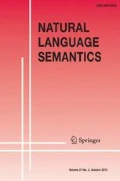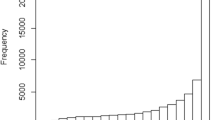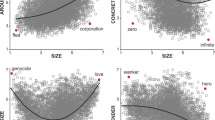Abstract
It has been a long-standing puzzle that Negative Polarity Items appear to split into two subvarieties when their effect on the interpretation of questions is taken into account: while questions with any and ever can be used as unbiased requests of information, questions with so-called `minimizers', i.e. idioms like lift a finger and the faintest idea, are always biased towards a negative answer (cf. Ladusaw 1979). Focusing on yes/no questions, this paper presents a solution to this puzzle. Specifically it is shown that in virtue of containing even (cf. Heim 1984), minimizers, unlike any, trigger a presupposition, which reduces the set of the possible answers to a question to the singleton containing the negative answer.
Similar content being viewed by others
REFERENCES
Barker, L. and E. Herburger: 2000, 'Even Even can be an NPI: Facts from Spanish', in Georgetown University Working Papers in Theoretical Linguistics 1, pp. 79–92. Georgetown University, Washington, DC.
Bennett, M.: 1977, 'A Response to Karttunen', Linguistics and Philosophy 1, 279–300.
Borkin, A.: 1971, 'Polarity Items in Questions', in L. Dobrin et al. (eds.), Papers from the Seventh Regional Meeting, pp. 53–62. Chicago Linguistic Society, Chicago.
Guerzoni, E.: 2003, Why ‘Even’ Ask? On the Pragmatics of Ouestions and the Semantics of Answers. PhD dissertation, MIT.
Han, C.-H: 1998, 'Deriving the Interpretation of Rhetorical Questions', in E. Curtis, J. Lyle, and G. Webster (eds.), Proceedings of WCCFL 16, pp. 237–253. CSLI Publications, Stanford.
Han, C.-H. and L. Siegel: 1996, 'syntactic and Semantic Conditions on NPI Licensing in Questions', in J. Camacho, L. Choueiri, and M. Watanabe (eds.), Proceedings of WCCFL 15, pp. 177–191. CSLI Publications, Stanford.
Heim, I.: 1984. 'A Note on Negative Polarity and DE-ness', in C. Jones and P. Sells (eds.), Proceedings of NELS 14, pp. 98–107. GLSA, Amherst, Mass.
Higginbotham, J.: 1993, 'Interrogatives', in K. Hale and S. Keyser (eds.), The View from Building 20, pp. 195–227. MIT Press, Cambridge, Mass.
Horn, L.: 1969, 'A Presuppositional Analysis of Only and Even', in R. Binnick, A. Davison, G. Green, and J. Morgan (eds.), Papers from the Fifth Regional Meeting, pp. 98–107. Chicago Linguistic Society, Chicago.
Horn, L.: 1989, A Natural History of Negation. The University of Chicago Press, Chicago.
Karttunen, L.: 1977, 'syntax and Semantics of Questions', Linguistics and Philosophy 1(3), 3–44.
Karttunen, L. and S. Peters: 1979, 'Conventional Implicature', in C.-K. Oh and D. Dinneen (eds.), Syntax and Semantics 11: Presuppositions, pp. 1–56. Academic Press, New York.
Krifka, M.: 2001, 'For a Structured Account of Questions and Answers' (revised version), in C. Fery and W. Sternefeld (eds.), Audiatur Vox Sapientia A Festschrift for Arnim von Stechow, pp. 287–319. Akademie Verlag, Berlin.
Ladusaw, W.: 1979, Polarity Sensitivity as Inherent Scope Relations, PhD dissertation, University of Texas, Austin.
Ladusaw, W.: 2002, 'The Biasing Effect of Polarity Items in Questions', paper presented at CLS 38. To appear in Papers from the Thirty-Eighth Regional Meeting. Chicago Linguistic Society, Chicago.
Lahiri, U.: 1998, 'Focus and Negative Polarity in Hindi', Natural Language Semantics 6(1), 57–123.
Lee, Y.-S and L. Horn: 1994, 'Any as Indefinite Plus Even', ms., Yale University.
Progovac, L.: 1993, 'Negative Polarity and Grammatical Representation', Linguistics and Philosophy 10, 49–180.
Rooth, M.: 1985, Association with Focus, PhD dissertation, University of Massachusetts, Amherst. GLSA, University of Massachusetts, Amherst.
Rooth, M.: 1996, 'Focus', in S. Lappin (ed.) 'The Handbook of Contemporary Semantic Theory, pp. 271–291. Blackwell, Oxford.
Rullmann, H.: 1997, 'Even, Polarity and Scope', in M. Gibson, G. Wiebe, and G. Libben (eds), Papers in Experimental and Theoretical Linguistics 4, 40–64.
Schwarz, B.: 2000, 'Notes on Even', ms, University of Stuttgart.
Stalnaker, R.C.: 1978, 'Assertion', in P. Cole (ed.), Syntax and Semantics 9: Pragmatics, pp. 315–332. Academic Press, New York.
Wilkinson, K.: 1996, 'The Scope of Even', Natural Language Semantics 4(3), 193–215.
Zwarts, F.: 1993, 'Three Types of Polarity', manuscript, University of Groningen. To appear in F. Hamm and E. Hinrichs (eds.), Semantics.
Author information
Authors and Affiliations
Rights and permissions
About this article
Cite this article
Guerzoni, E. Even-NPIs in YES/NO Questions. Natural Language Semantics 12, 319–343 (2004). https://doi.org/10.1007/s11050-004-8739-0
Issue Date:
DOI: https://doi.org/10.1007/s11050-004-8739-0




